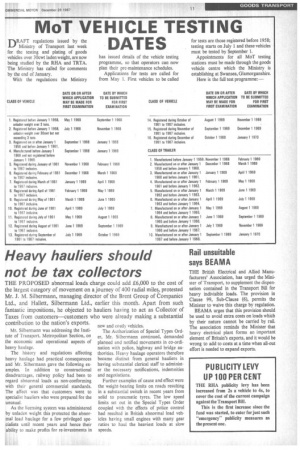Heavy hauliers should not be tax collectors
Page 13

If you've noticed an error in this article please click here to report it so we can fix it.
THE PROPOSED abnormal loads charge could add £6,000 to the cost of the largest category of movement on a journey of 400 radial miles, protested Mr. J. M. Silbermann, managing director of the Brent Group of Companies Ltd., and Hallett, Silbermann Ltd., earlier this month. Apart from such fantastic impositions, he objected to hauliers having to act as Collector of Taxes from customers-customers who were already making a substantial contribution to the nation's exports.
Mr. Silbermann was addressing the Institute of Transport, Metropolitan Section, on the economic and operational aspects of heavy haulage.
The history and regulations affecting heavy haulage had practical consequences and Mr. Silbermann gave the following examples. In addition to constructional disadvantages, railway policy had been to regard abnormal loads as non-conforming with their general commercial standards. The affect was that customers went to specialist hauliers who were prepared for the unusual.
As the licensing system was administered by unladen weight this protected the abnormal load haulage for a few privileged specialists until recent years and hence their ability to make profits for re-investments in new and costly vehicles.
The Authorization of Special Types Order, Mr. Silbermann continued, demanded planned and notified movements in co-ordination with police, highway and bridge authorities. Heavy haulage operators therefore became distinct from general hauliers in having substantial clerical staff to administer the necessary notifications, indemnities and negotiations.
Further examples of cause and effect were the weight-bearing limits on roads resulting in a substantial switch in recent years from solid to pneumatic tyres. The low speed limits set out in the Special Types Order coupled with the effects of police control had resulted in British abnormal load vehicles having small engines with many gear ratios to haul the heaviest loads at slow speeds.












































































